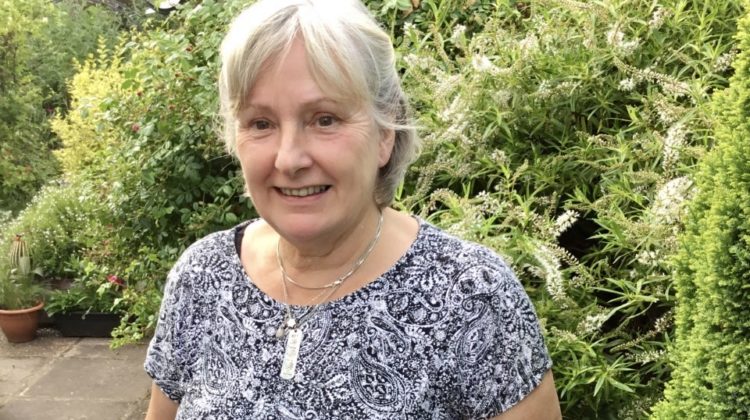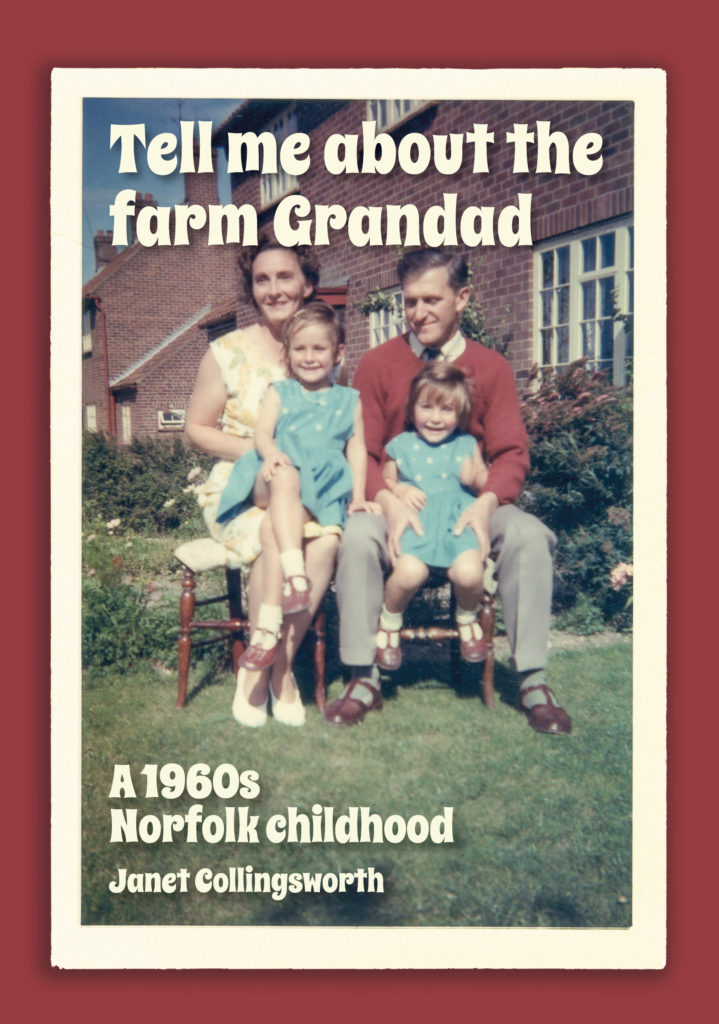
Janet Collingsworth never intended to write a book about her experience of growing up in Norfolk in the 1960s. But write it she did, and the result is Tell me about the farm Grandad, published today. Here, Janet explains why everyone has their own story to tell
I suppose my life hasn’t been so different to that of other people. There have been ups and downs, mostly ups but a few horrible downs. Overall, I would say I’ve had a happy and fulfilling life, especially since I met my husband and inherited a readymade family. I have two lovely stepdaughters and two beautiful granddaughters aged eight and two, so I am doubly blessed.
Looking back, my childhood was pretty much idyllic especially compared with childhood today. I know there will always be an element of ‘rose coloured spectacles’ but I think people were kinder to each other. There was a greater sense of community, of belonging. It may have been partly because married women didn’t go out to work as much as they do now, so they had more time for us and each other. People didn’t lock their doors; they didn’t need to. It was a slower pace of life. I think we were on the brink of change. But changes were slow to come to Norfolk. Being a rural area there was less contact with the outside world. We didn’t have telephones, television, if you could afford it was black and white. The main source of news was the local EDP. People only came to Norfolk if they had to. We were out on a limb and happy to be!
I think it is important to say that Tell me about the farm, Grandad is MY memoir. Everything I have written about happened. So, MY memoir becomes a record of Social History. This was how the 60s in Norfolk were when I was growing up. It is how I saw them.
At the beginning of the pandemic, we didn’t pay too much attention to what was happening on the other side of the world, and we carried on much as usual thinking it would all blow over. It started to become worrying when we saw the death tolls rising and when it began to creep closer across the globe.
Looking back, it seems almost laughable that we got so obsessed with loo rolls but somehow, we did. I think that seeing all the empty supermarket shelves was so scary, we latched onto something as basic as loo rolls as a kind of symbol.
I always try to keep my cupboards reasonably well stocked but as time went on and I could see my shelves emptying, I began to get hung up with this ‘loo roll thing’ too. If we had loo roll, we were ok. This meant trips to the supermarket at strange times just in case there had been a delivery. Like I said, it sounds silly now, but it was deadly serious at the time. At one point we got down to our last loo roll. (I still have a 24-pack under the bed, just in case).
At the heart of it, I wanted to have enough in the cupboard so that I could help someone else be they family, friend or neighbour. It really mattered to me that I should be able to help someone else.
In terms of what I have learned about myself, I suppose I now try to live for the day, and I’m trying to relax and enjoy life more. I certainly appreciate what I have got, not necessarily material things (though I do love our cottage and my garden) but the people in my life. Little things like a beautiful sunset or sitting and watching the sea. A granddaughter’s hug and a kiss with a whispered, ‘I love you so much nanny,’ or when mum opened her eyes and smiled at me from her hospital bed and said, ‘you’re a good girl’. Little things that mean so very much.
I didn’t really intend to write a book. I’ve always kept a diary or journal of some sort and recorded happenings, family-related or otherwise. I also kept newspaper cuttings and the like (I got that from mum), so I had a bank of ‘memories’ stuffed in to a drawer.
I entered the Let’s Talk short story competition three years running and came third, runner-up, then winner. But none of these were anything to do with Tell me about the farm.
Because of covid restrictions, Angi Kennedy, Editor of the magazine, delivered my prize to my home. We got talking and I showed her some of my writing and it was she that suggested that I should develop my writing. She also suggested a publisher that I should contact, Paul Dickson.
Tell me about the farm was originally going to be a short story but as I started writing I quickly realised that there was too much to leave it at that.
Having worked with people living with dementia, I knew how important memories are. At my dementia support groups people often learned things from their loved one that they hadn’t known before. I also realized that some of the stories they told were being lost because they sometimes had no one to share them with.
Closer to home, I realized that the stories my parents and grandparents told would also be lost unless they were written down.
This was when the book started and, once started it kind of wrote itself. This was a couple of years or so back and there was a delay in being able to take things further because of Covid. However, once we were allowed to leave our homes and meet other people, we were able to proceed.
I’ve really enjoyed writing my auto biography and have been surprised at how the memories keep flooding back. Even now, things come to mind that I could have included had I remembered them in time.
It’s been lovely to relive some of the happy times and to spend time with people who are no longer here. For me, writing the book has been a joy but I can see that some people might find it difficult.
What I would suggest is having a memory box and just writing down memories on postcards, taking photos (always dates, locations, name on the back), newspaper cuttings of interest. They don’t need to be in any sort of order. It could be that the whole family contribute their memories to the box. A scrap book would work equally well. But, either way, it would be a legacy for the family and something that could be added to.
In terms of there being more ‘gentle’ memoirs on the bookshelves, everyone has their own story to tell. So, yes, it would be nice to see more but we can only write about our own experiences. If, like mine, your memories are good you might feel happy to share them as I have done. Perhaps if your experiences were not good you might not want other people to know.
My family are really happy with the book and excited about its launch. Grandad would have been so proud of me and our book. He would have made sure everyone knew about it! He would have had a huge grin on his face, as would my dad. None of us ever dreamed that we would be on the front cover of a book!
My mum has always said that she didn’t want to read my manuscript, she wanted to wait until she had a copy of the book with my name on the front. Sadly, she can no longer see well enough to do so but we will read some of it to her.
I have already written something else! I’ve written two stories that could be back to back in one book and I’m half way through writing the next decade of my memoirs, so we will have to see what happens. Even if they are never published, they will be part of the family archives.
I’m also trying to get my head round all the copious notes I made during the pandemic. I think there’s a book in there. I haven’t talked to Paul (Paul Dickson, my publisher) about any of these yet so watch this space, as they say. I’m just grateful to Paul for having the faith in me to help publish Tell me about the farm Grandad.

Tell me about the farm Grandad, A 1960s Norfolk Childhood, by Janet Collingsworth, price £11, is on sale at www.allthingsnorfolk.com, Jarrold Norwich, Jarrold Cromer, Waterstones Norwich, Revelation Christian Bookshop Norwich and Not Just Books Thetford. Visit www.pauldicksonbooks.co.uk









Leave a Reply